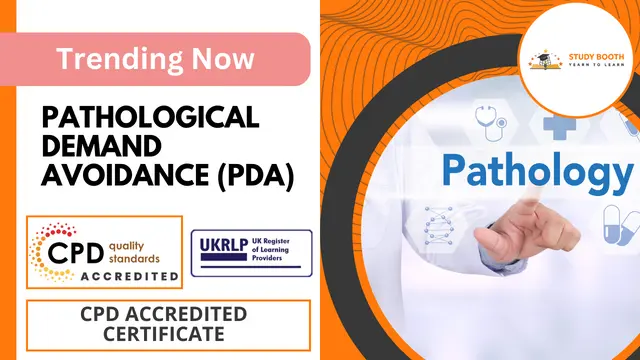
Pathological Demand Avoidance (PDA)
FREE CPD Accredited Certificate || Advanced Learning Method || Lifetime Access || 24/7 Expert Support
Study Booth
Summary
- Certificate of completion - Free
- Certificate of completion - £9.99
- Exam(s) / assessment(s) is included in price
- Tutor is available to students
Add to basket or enquire
Overview
Dive into the intricacies of Pathological Demand Avoidance (PDA). Unravel the history, the link with autism, and its impact on learning. Explore the path less travelled and illuminate minds!
Pathological Demand Avoidance (PDA) is a unique and intriguing facet of the autism spectrum. This course provides a deep dive into its core aspects. Begin with a foundational look into PDA and its history. Delve into the relationship between autism, sensory processing disorders, and PDA. Assess the challenges and solutions for PDA in educational settings. Wrap up with a focus on learning disabilities and their intersection with autism.
Don't miss this chance to broaden your horizon – embark on this Pathological Demand Avoidance (PDA) learning journey today!
Learning Outcomes:
After completing this Pathological Demand Avoidance (PDA) course, you will be able to:
- Illuminate the key concepts surrounding PDA.
- Identify the correlation between autism and PDA.
- Analyse the presence and effects of PDA in educational environments.
- Recognise the traits of sensory processing disorder linked with PDA.
- Distinguish between learning disabilities and their relation to autism.
Certificates
Certificate of completion
Digital certificate - Included
After successfully completing this Pathological Demand Avoidance (PDA) course, you will qualify for the CPD QS -certified certificate. The PDF Certificate will be completely free.
Certificate of completion
Hard copy certificate - £9.99
The hardcopy certificate for this Pathological Demand Avoidance (PDA) course can be received by paying £9.99, for students living inside the UK. For international orders, the total fee is £14.99 (£9.99 Certification Fee + £5 postal charge).
CPD
Course media
Description
Discover the intricate aspects of Pathological Demand Avoidance (PDA) and its connection to Autism Spectrum Disorder (ASD). Gain comprehensive knowledge of supporting individuals with PDA in both educational and home environments. This course delves into the characteristics of PDA and explores sensory processing difficulties associated with this condition. Uncover the historical background of PDA and understand its evolution. Learn effective strategies to communicate with individuals with PDA and navigate their unique challenges. Whether you are a parent, teacher, or professional in the field, this engaging course will equip you with skills to foster an inclusive environment for individuals with PDA.
Course Curriculum of Pathological Demand Avoidance (PDA)
- Module 01: Introduction to Pathological Demand Avoidance
- Module 02: Understanding Autism
- Module 03: PDA in Schools and Parent Information
- Module 04: Sensory Processing Disorder
- Module 05: The History of PDA
- Module 06: Learning Disability and Autism
Who is this course for?
Pathological Demand Avoidance (PDA)
- Parents or caregivers of individuals with PDA.
- Teachers and educational professionals working with students with PDA.
- Professionals in the field of Autism and special education.
- Support workers and therapists assisting individuals with PDA.
- Anyone interested in understanding and supporting individuals with PDA.
Requirements
This Pathological Demand Avoidance (PDA) course has no set requirements for learning. All you need is a smart device, a reliable internet connection, and a basic command of English and you're good to go!
Career path
After completing this Pathological Demand Avoidance (PDA) course, here are a few careers you can opt for:
- Special Education Teacher (£32,000-£46,000)
- Autism Educator (£30,000-£45,000)
- Behaviour Analyst (£30,000-£55,000)
- Speech and Language Therapy (£24,000-£40,000)
- Occupational Therapy Worker (£24,000-£40,000)
Questions and answers
Currently there are no Q&As for this course. Be the first to ask a question.
Reviews
Currently there are no reviews for this course. Be the first to leave a review.
Legal information
This course is advertised on reed.co.uk by the Course Provider, whose terms and conditions apply. Purchases are made directly from the Course Provider, and as such, content and materials are supplied by the Course Provider directly. Reed is acting as agent and not reseller in relation to this course. Reed's only responsibility is to facilitate your payment for the course. It is your responsibility to review and agree to the Course Provider's terms and conditions and satisfy yourself as to the suitability of the course you intend to purchase. Reed will not have any responsibility for the content of the course and/or associated materials.





